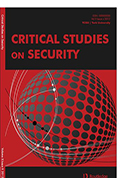Dysfunctional, but stable – a Bourdieuian reading of the global nuclear order

Author(s): Ursula Jasper
Journal Title: Critical Studies on Security
Volume: 4
Issue: 1
Publication Year: 2016
